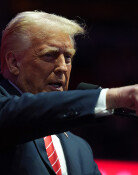An era where everyone is angry at everyone
An era where everyone is angry at everyone
Posted August. 01, 2023 08:37,
Updated August. 01, 2023 08:37
When former U.S. President Donald Trump appeared at the district attorney’s office in Lower Manhattan on April 4 (local time) this year, the view of the park in front of the courthouse was interesting. A fence erected by the New York Police Department (NYPD) ran diagonally across the park. On either side of the fence, people from the anti-Trump and pro-Trump camps were leaning against it and shouting at each other. Neither side was listening to the other, anyway.
I met people on both sides of the fence. Both sides raised their voices, claiming they were patriots and expressing how much the other side was ruining the country. One Trump supporter vented his distrust and frustration with the media, saying, “Please keep my comments anonymous. The FBI (Federal Bureau of Investigation) can come after me.”
This intriguing park scene felt like a vivid representation of the 'everyman against everyman' rage that is spreading across the United States. Hostility toward groups that one is not a part of is increasingly prevalent. The nation is embroiled in 'culture wars,' encompassing political affiliation, abortion, gender identity, and race, while tensions persist between generations - Millennials, Generation Z, and baby boomers (born between 1946 and 1964). The divisions have prompted people to use 'Divided States of America' instead of the United States of America.
Recently, there was a controversy in New York surrounding an incident involving a woman dubbed ‘Citi Bike Karen.' The term 'Karen' is considered derogatory and is used to refer to middle-aged white women, akin to the Korean term 'Mrs. Kim' or 'Mom-Choong.' In a 90-second video shared on social media, a white pregnant woman screams "Help me" while arguing with a group of black teenagers over renting an e-bike. The situation was viewed through the lens of race, with the white woman portraying herself as a victim while taking possession of the black teenagers' bike and attempting to criminalize them. Furthermore, the incident could also be interpreted through the lens of gender, where the men in the group were putting pressure on the pregnant woman. The public largely supported the racial perspective, labeling the pregnant woman as a 'racist Karen.’
Then there was a twist. A receipt surfaced, proving that the white woman had rented the bike first and that the teens had tried to steal it. Even an NYT columnist cautioned against senseless 'Karen stigmatization,' saying, 'The woman's evidence seems more credible. This is a classic case of victimization by people who see only what they want to see, choosing whom to hate based on a short video that doesn't tell the whole story.
Politics, which is supposed to be about compromise and mediation, is instead blinded by votes and fuels conflict and anger. Every issue has been transformed into a political agenda, and even climate change and energy policy have become battlegrounds between liberals and conservatives. Even electric cars and Twitter are suspected of having political affiliations. In the run-up to next year's presidential election, several U.S. states are introducing bills to sharpen the ideological battle, such as 'punishing librarians for banned books' and 'protecting third gender.'
The vicious cycle of conflict and controversy, amplified by politics, doesn't just set our democracy back; it also lowers marriage rates. According to The Atlantic, young people weed out potential matches by looking at their political affiliations on dating apps. Since 2010, women have been moving toward liberals, and men toward conservatives, resulting in only 0.6 men for every liberal woman and 0.6 women for every conservative man, making it difficult for them to find compatible partners. The Atlantic also mentioned Korea, where “the ideological gap between men and women is even wider, and as a result, marriage and fertility rates are at record lows.”
There are many explanations for why rage, mockery, and hate speech against different groups have become a global phenomenon, including political and economic polarization and the impact of social media. It's hard to diagnose and even harder to fix, but the price is too high to sit on our hands.






